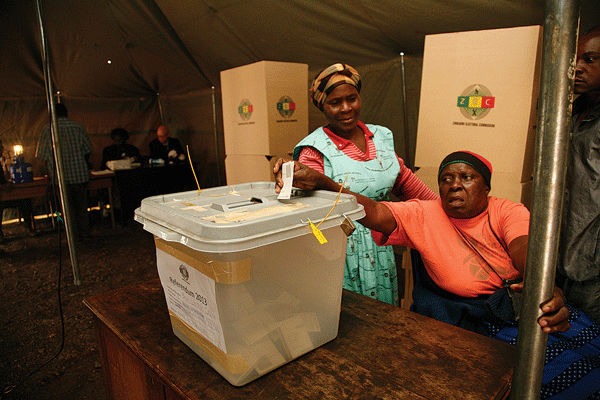
Zanu PF unveiled its 2018 elections manifesto last Friday, signalling the start of the ruling party’s campaign even as it was reeling from chaotic primary polls.
The party, which has been in power for the past 38 years, is promising to open Zimbabwe for business in order to create jobs and eradicate poverty.
Zanu PF also spelt out how it intends to continue advancing its land reform agenda and achieving a 6% per annum economic growth, in the next five years.
In the weeks ahead, the party is expected to aggressively market its manifesto and already gigantic billboards with the beaming face of President Emmerson Mnangagwa — the Zanu PF presidential candidate — have become a common feature in the country’s urban areas.
Some of the promises, like the controversial pledge to deliver 2,2 million jobs in the Zanu PF manifesto for the 2013 elections, are, for lack of a better word, outlandish.
For instance, the ruling party is promising to build 1,5 million houses in the next five years, which can translate into 300 000 houses a year.
Ironically, during the launch of the manifesto, vice-president Constantino Chiwenga had no kind words for MDC Alliance presidential candidate Nelson Chamisa for promising to create spaghetti roads, airports across the country and introducing bullet trains.
He described Chamisa’s ideas as “childish talk like transforming the world into some place never lived before”.
- Chamisa under fire over US$120K donation
- Mavhunga puts DeMbare into Chibuku quarterfinals
- Pension funds bet on Cabora Bassa oilfields
- Councils defy govt fire tender directive
Keep Reading
Such contestations are to be expected in the two or so months ahead as various political parties sell their policies to undecided voters ahead of the crucial presidential, parliamentary and local government elections.
The MDC Alliance has been on the campaign trail for a while now trying to sell itself as an alternative to Zanu PF and trashing the ruling party’s track record in government.
Election campaigns are by their nature bruising contests where opponents do not normally take any prisoners.
However, choosing representatives for political office should never be a matter of life and death. Previous elections in Zimbabwe have been characterised by extreme violence and hate language.
The ouster of long-time ruler Robert Mugabe in a coup last November brought some hope that the demons of political violence would be exorcised and Mnangagwa has promised as much at various fora since he took over from his mentor.
The so-called new dispensation is a unique window for Zimbabweans to redeem themselves by ensuring the forthcoming election is credible and violence-free.
A campaign period devoid of violence and hate language will be a prerequisite for such an outcome.
Candidates are better off marketing their policies and critiquing those proffered by their opponents than focusing on personalities as this often spawns hate speech and violence.
It will be refreshing if this campaign, maybe for the first time in the history of Zimbabwe, is about issues instead of being a violent contest where the majority ends up being disenfranchised.











